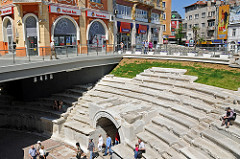
Last week I had the opportunity to attend a science writing workshop organized by Christianity Today. I wrote a few pieces for their e-magazine The Behemoth and since they are now looking to expand their science coverage in their main magazine, they kindly invited me to participate. I appreciated the opportunity to reflect in a more focused fashion on my role as a science communicator, on the promotion of science versus the practice of science, and on what readers want and need from science coverage. After a day and half of contemplation, I only had to get into the cab to the airport for a chance at practical application.
First, my Bulgarian cab driver shared some fascinating pictures of the Roman architecture underneath his home town of Plovdiv. Then he said “I was just reading something my friend shared on Facebook…” and I’ll admit I braced for, well, any of the myriad rabbit holes we all know are lurking online. Turns out it was a story about a cure for cancer that they have in Cuba and some South American countries, but not the United States. He said it has saved over 100,000 lives and lamented the forces preventing this cure from benefiting more sick people. I was certainly curious; alternative cancer cures are bountiful and popular, but there were enough details to make me think I could maybe find what he was talking about. Then he told me about vitamin B17 which he assured me was the best vitamin for cancer prevention but of course you can’t buy it as a supplement so you have to get it from the pit of apricots. This was also news to me, but again helpfully specific.
Since I wasn’t familiar with either story, I tried my best to be a polite and active listener without committing to anything. I could certainly share his concerns for the cost of healthcare and his desire to see better treatment options for cancer. I was skeptical, but only in the vague way one is skeptical of any popular Facebook story. I didn’t have any specifics, nor any reason to think he would be receptive to counterclaims. When he dropped me off, I thanked him for the information and said I’d pick up some apricots when I got home.
If you don’t remember there being a vitamin B17, you’re not wrong. Apricot pits contain amygdalin, a cyanogenic glycoside, which is essentially a chemical that can be converted into cyanide. Plants make these chemicals as a defense mechanism. Amygdalin was tested as a potential cancer treatment, but it was not effective. Nevertheless, it has been branded vitamin B17 to make it sound healthy and promoted to treat cancer. It actually has the potential to make you sick because of the possibility of being metabolized into cyanide. After I learned all of this, I felt slightly bad that I hadn’t known it sooner and offered some form of warning. On the other hand, the cab driver would have had no reason to think I was a credible source.
I believe the other story he mentioned was about CIMAvax, a vaccine developed in Cuba which has provided some benefit to patients with non-small-cell lung cancer. Results are modest, extending life by a few months on average. But a vaccine is a minimally disruptive treatment with minor side effects compared to the toll chemotherapy, radiation or surgery can take. Your own immune system does the heavy lifting. Such immunotherapies are gaining traction as cancer treatments, and CIMAvax is one of several promising options. It is not a miracle cure, but it may lead to even better therapies. As far as I can tell it hasn’t cured 100,000 people, although I found some recent articles on alternative medicine sites making that claim. Between that and the specific countries the cab driver mentioned being the ones CIMAvax has been tested in makes me think it’s what he had read about. The biggest discrepancy is actually good news; the vaccine will soon be brought to the United States for testing here.

 )
)Having CIMAvax tested in the US is good news for lung cancer patients, good news for US-Cuba relations and good news for international research collaboration. But what to make of the partial truths making the rounds of our social media networks? Clearly we are eager for relief from what ails us and our loved ones, and understandably so. We want simple, concrete steps that can be taken today, not a complicated explanation of why we should wait for better answers tomorrow. And I think we want to live in a world that makes sense, which is why we’d rather believe solutions exist but are being withheld than to believe some answers are genuinely unknown and perhaps unknowable. Human agency is something we understand well, even and perhaps especially in the service of selfish ends. The dynamics of microscopic cells reacting to myriad chemical signals are far too abstract.
A preference for human agency is something we see in theological conversations also. Faced with a blind man, Jesus’ disciples ask if the man sinned or his parents to cause his affliction. Jesus rejects their premise; not everything can be traced back to human activity or human choices. I’ve commented on this before with respect to the book of Job. The Bible calls us to consider a God who isn’t just a magnified version of ourselves. In that respect, I think it actually resonates with science.
At dinner one night at the science writing workshop, conversation flowed to the challenging of calling people away from false information, like the supposed benefits of amygdalin, on scientific topics. The answers from both research and personal experience seem to depend heavily on relationships rather than clear and accurate presentation of the facts. This conclusion was greeted as mildly discouraging, since building relationships is time consuming and does not scale well to reaching large numbers at once. And yet as Christians we should hardly be surprised, since the scriptural picture of sharing truth is likewise relationally intensive.
In light of that, I would like to see my science communication focus more on conversation and discussion, rather than just monologuing. The nature of blogging and writing means I won’t be able to completely get away from one directional communication, but I can make some changes. I have ideas, but in the spirit of dialogue I’d like to hear from you.
- How do you foster discussion on rich topics in your discipline, either in person or online?
- What can I do to be more inviting to conversation on this blog?
- What science questions do you have that we can chat about?
- How can I help you with science conversations you are having with your family, your colleagues, your church or your community?
Andy has worn many hats in his life. He knows this is a dreadfully clichéd notion, but since it is also literally true he uses it anyway. Among his current metaphorical hats: husband of one wife, father of two teenagers, reader of science fiction and science fact, enthusiast of contemporary symphonic music, and chief science officer. Previous metaphorical hats include: comp bio postdoc, molecular biology grad student, InterVarsity chapter president (that one came with a literal hat), music store clerk, house painter, and mosquito trapper. Among his more unique literal hats: British bobby, captain’s hats (of varying levels of authenticity) of several specific vessels, a deerstalker from 221B Baker St, and a railroad engineer’s cap. His monthly Science in Review is drawn from his weekly Science Corner posts — Wednesdays, 8am (Eastern) on the Emerging Scholars Network Blog. His book Faith across the Multiverse is available from Hendrickson.

Leave a Reply